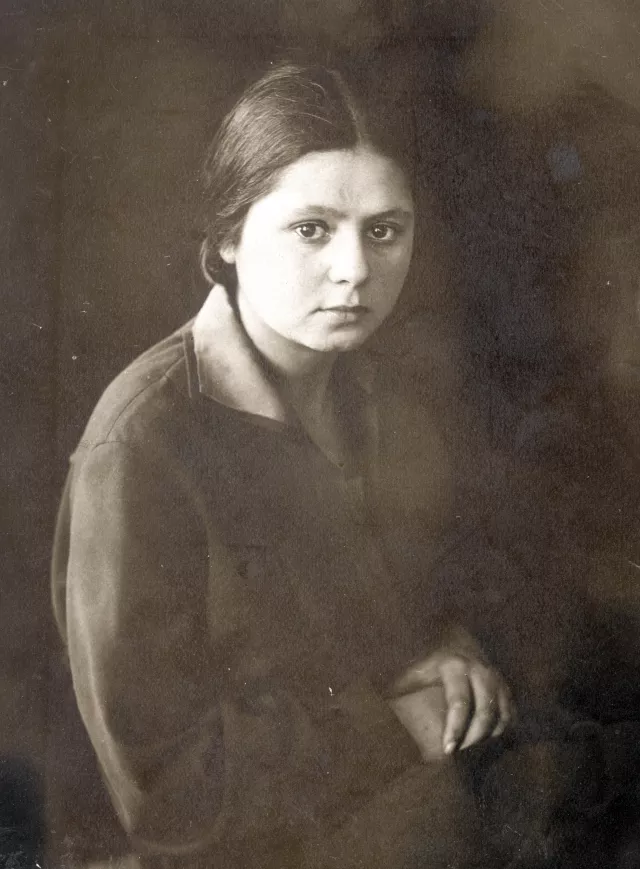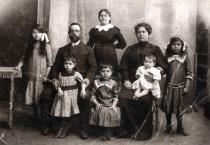Rosa Bunina
This is my aunt Rosa Bunina, my mother's sister, the most beautiful out of the eight sisters.
The picture was taken in Bishkek in 1929, Rosa was a student of the Medical Institute at that time. During the Great Patriotic War she took in all of her sisters with their children and her father into her two-room apartment in Kyrgyzstan. She was married three times but had no children and was a patroness to her twelve nephews.
The fifth daughter of my grandparents, Reizl, born in 1909, united all sisters around herself. After finishing school she graduated from the Medical Institute. She got married while at university. Her husband, David, perished during the siege of Leningrad. After graduation from the institute she was assigned to Kyrgyzstan, got married for the second time, to Nikolai Amurov. All family got together at their place during the Great Patriotic War.
After the war Reizl worked as a doctor at the Railroad hospital, divorced Amurov and got married for the third time, to Boris Bely, also a doctor, but a veterinarian, with whom she lived for 25 years. He also survived the war; it caught him in Tallinn, in Estonia. He left for Russia on a ship and finished the war in Germany. Bely died in 1971. They had no children, and Reizl was a patroness of all her nephews and nieces. There were twelve of us. She died in 1989 in Leningrad and was buried at the Jewish cemetery.
By the summer of 1941 Mother's sister Rosa and her husband worked in Kyrgyzstan after graduation from the First Medical Institute. They immediately sent us some money and an invitation to come to their place, Bishkek station. Since Grandfather was old and sick, we were afraid to take him with us in such hot weather, so I went together with Mother and left Grandfather in that house in Zavoronezh.
After long transfers on different trains we came to Bishkek, to Aunt Rosa and her second husband, Nikolai Amurov. Mother immediately found a job as an economist at the railroad,
This is my aunt Rosa Bunina, my mother's sister, the most beautiful out of the eight sisters.
The picture was taken in Bishkek in 1929, Rosa was a student of the Medical Institute at that time.
During the Great Patriotic War she took in all of her sisters with their children and her father into her two-room apartment in Kyrgyzstan.
She was married three times but had no children and was a patroness to her twelve nephews.
The fifth daughter of my grandparents, Reizl, born in 1909, united all sisters around herself. After finishing school she graduated from the Medical Institute.
She got married while at university. Her husband, David, perished during the siege of Leningrad. After graduation from the institute she was assigned to Kyrgyzstan, got married for the second time, to Nikolai Amurov. All family got together at their place during the Great Patriotic War.
After the war Reizl worked as a doctor at the Railroad hospital, divorced Amurov and got married for the third time, to Boris Bely, also a doctor, but a veterinarian, with whom she lived for 25 years.
He also survived the war; it caught him in Tallinn, in Estonia. He left for Russia on a ship and finished the war in Germany. Bely died in 1971. They had no children, and Reizl was a patroness of all her nephews and nieces. There were twelve of us. She died in 1989 in Leningrad and was buried at the Jewish cemetery.
By the summer of 1941 Mother’s sister Rosa and her husband worked in Kyrgyzstan after graduation from the First Medical Institute. They immediately sent us some money and an invitation to come to their place, Bishkek station.
Since Grandfather was old and sick, we were afraid to take him with us in such hot weather, so I went together with Mother and left Grandfather in that house in Zavoronezh. After long transfers on different trains we came to Bishkek, to Aunt Rosa and her second husband, Nikolai Amurov.
Mother immediately found a job as an economist at the railroad, but from the very first minute understood that she couldn’t allow herself to be intimidated as the wife of an ‘enemy of the people,’ so she wrote in the questionnaire that she had been a widow since 1936. Mother worked as an economist-planner during the evacuation at the Railroad Administration in Kyrgyzstan.
In October 1941 all our relatives from Leningrad came to visit us in Kyrgyzstan: Aunt Maria, Aunt Hanna and Aunt Pasha. Eshka had her preliminary diploma practical work in Kazan, so she and her daughter joined us later.
All husbands of my mother’s sisters served in the army and stayed in besieged Leningrad during the blockade. Only Aunt Hanna’s husband, Solomon Kaplan, was a civil engineer and worked at a plant during the blockade.
There were eighteen people in the two-room apartment of my aunt Rosa: the eight Bunin sisters, their eight children, Grandfather, who came later, and a distant relative of one of my aunts, who kept our household.
We lived in harmony like that during the whole war, helping each other. but from the very first minute understood that she couldn't allow herself to be intimidated as the wife of an ?enemy of the people" so she wrote in the questionnaire that she had been a widow since 1936. Mother worked as an economist-planner during the evacuation at the Railroad Administration in Kyrgyzstan.
In October 1941 all our relatives from Leningrad came to visit us in Kyrgyzstan: Aunt Maria, Aunt Hanna and Aunt Pasha. Eshka had her preliminary diploma practical work in Kazan, so she and her daughter joined us later. All husbands of my mother's sisters served in the army and stayed in besieged Leningrad during the blockade. Only Aunt Hanna's husband, Solomon Kaplan, was a civil engineer and worked at a plant during the blockade.
There were eighteen people in the two-room apartment of my aunt Rosa: the eight Bunin sisters, their eight children, Grandfather, who came later, and a distant relative of one of my aunts, who kept our household. We lived in harmony like that during the whole war, helping each other.















